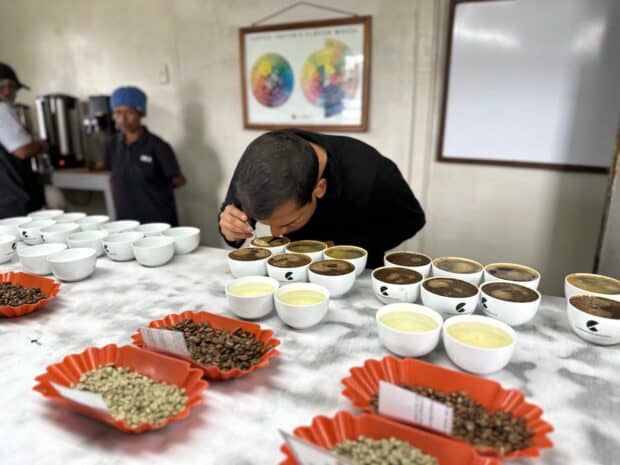After passing the Illinois state bar, Vikram Patel practiced law for two years. During that time, he was also sowing the seeds of a green coffee business that has since transformed the reputation of Papua New Guinea coffees among scores of United States roasters.
The founder and director of Chicago-based, PNG-focused Benchmark Coffee Traders, Patel was first bitten by the proverbial coffee bug while spending a summer PNG during his second year of environmental law studies, which happened to coincide with the harvest season.
Patel with Benchmark Quality Control Manager Kurtis K with parchment producer Kenneth Netkins in PNG.
“When I returned to law school, I made a dedicated effort to learning everything I could about coffee,” Patel recently told DCN. “I started brokering containers for the producers and my first buyers were large, established importers. During this period, I also visited roasters in my own time as I continued to immerse myself in all things coffee.”
While continuing to cultivate direct relationships with producers in PNG, thanks to family relationships in the country, Patel formally founded Benchmark in 2015. Initially seeking to move PNG coffees of all grades, the business found early interest in the U.S. market among buyers seeking higher-end specialty coffees, especially coffees connected to social initiatives.
“My sense of the buyers in the third and fourth wave markets is that convenience and price are not the only factors that matter — in fact, they may not even be the most important factors for many buyers,” Patel said of the business today. “I think buyers in this part of the industry are looking to source high-quality coffees as directly as possible and with production and sourcing integrity. They like buying directly from producers or smaller providers that are specialized and have a close proximity to the coffees.”
A large part of Benchmark’s pitch is the company’s long-term relationships with producers and continued social and environmental projects. The company maintains multiple funds, one supported by partnering roasters, for coffee-growing community resources such as school supplies and clean water tanks. A primary estate within the Benchmark network ensures free housing for all coffee pickers, free schooling for workers’ children and free AIDS screening, among other social initiatives.
“We don’t just buy and sell coffees,” Patel said. “We are actively involved with our partners at the farm level and we have a large emphasis on educational support for our roaster-partners in the U.S.”
One of Benchmark’s loftiest goals has been meeting the benchmarks of quality associated with the high-end specialty coffee market. The company maintains post-harvest processing guidelines for a line of PNG-grown coffees under the name Kula, all of which were subjected to meticulous sorting, raised bed drying and washed processing, according to the company.
“We seek out and work with quality focused producers that achieve much more desirable flavors,” Patel said. “We also have extra processing done for most of our coffees which is aimed at better drying and more rigorous sorting. The coffees we offer are characterized by floral aromas, red fruits, hints of tropical fruit, chocolate, raisin, mulling spices and citrus acidity.”
Here’s more from our recent conversation with Benchmark Coffee Traders Owner Vikram Patel…
What about coffee excites you most?
I find the emphasis on ethical sourcing and social good in specialty coffee incredibly exciting. The fact that roasters in the third and fourth wave market strive to pay fair prices is a game changer for producers that can reach this market. I believe deeply in the power of socially responsible business… To me, the pinnacle is to do well by doing good. I see this opportunity in working with producers to access the specialty market and I’m proud of the social projects we’ve been able to invest in and grow at origin. The fact that these values are imbedding themselves in coffee, one of the most successful consumer products in human history, is that much more exciting.
What about coffee troubles you most?
While it’s so exciting to see specialty coffee grow with good values, there is growing deceptive advertising that has come along with that. It’s easy to post a picture of a farmer and make it look like the coffee was sourced directly and ethically. General consumers will usually not be able to tell and many sellers exploit that, both roasters and even importers. I’d encourage people to vet the coffees, ask questions, ask your importer if they were the importer of record. There are lots of good providers out there who meet the sourcing standards and competitive pricing. Find the good ones, they’ll take great care of you.
What would you be doing if not for coffee?
I suppose I’d be a lawyer. I have a lot of respect for people that love it, but I was not one of them. I like to think that I’d find my calling in some other way. In any case, I’m so grateful that I found my calling in specialty coffee and I’m so excited to keep building within our corner of the industry.
Nominate someone you admire for a Three Questions feature story here.
Related Posts
Nick Brown Nick Brown is the editor of Daily Coffee News by Roast Magazine.


